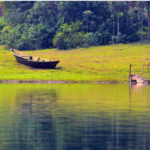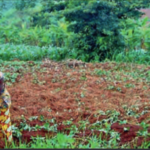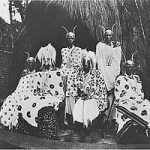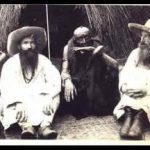XIII. Epilogue
If Ruanda was a State at all, it was a State before the Europeans occupied it. It had been an isolated area, with only a trickle of trade goods entering it and these were used largely by the ruling class. Like the kingdoms surrounding it, it was a self-sufficient entity, producing enough food for itself and sometimes less than enough.
The European occupants of Ruanda have always felt that the Munyarwanda peasant was exploited. But, if exploitation includes an idea of profit, this was impossible in Ruanda because there was no market to sell to and there was no incentive to increase production to sell surpluses. The system insured the ruling class’ subsistence as well as that of the peasant producer. Production varied, of course, within certain limits above and below the level of sheer subsistence so that there were years of shortage and years of abundance. But production was not increased deliberately, or else what would they have done with the excess? In times that were not so long past there were no market places at all in Ruanda. Some were founded outright by the Belgian administration; others, very few, sprouted spontaneously relatively late. All remained relatively unimportant and came to play a strictly local role which, if coffee is disregarded, had some of the outward forms of commerce but structurally had very little in common with it.
Yet it is highly probable that the society was never static, or at least never as static as it has been made to appear. Political power, considered as a commodity, was highly mobile. Perpetual contests between individuals, between groups, and between institutions, were constantly reestablishing a balance of power at all levels — but always within the frame of the Tutsi-dominated monarchy. The relationships changed and the power groups reorganized in an elaborate pattern of fission and fusion. This process may possibly be found, at least in germinal form, in tribal societies, but without the intensity that it had achieved in Ruanda. Further analysis of the fact of this intensity may reveal that it is more significant than appears at first glance.
The action of the play for power was to seek out the locus of the greater power-potential. Once this was determined, the end result was inevitable; the stronger party eventually absorbed the weaker, initiating a trend towards evergreater centralization or, as Richard N. Adams phrases it, towards greater “incorporation”.Indeed, if power, as a commodity could be centralized at the local level, as it was in Remera, the small community would not find real competition within itself. For further tests of strength and plays for power it would have to compete with other groups like itself. From these it would seize power, or give up its own power to them. This fusion process need not destroy the weaker groups physically, they become part of the new larger group. But accompanying the appearance of the new fused corporate group, there is a kind of fission that appears within. The process is well described in the following quotation from Protessor Adams’ paper:
The former corporate groups, with the loss of their own power centers, now reverted to some of the characteristics of the earlier common groups that were also, it will be remembered, without a power center. This new kind of group, which, following Firth, I want to call the sectional group, is essentially a residential and reproductive entity. It is similar to the common groups in that it is very fissiparous and fusible in accordance with the demands of ecology and personal disputes, but also must answer to power demands from the corporate center.
In this new situation a given individual may belong to both a given sectional group and a corporate ruling group.
Obviously, this process of incorporation involved more and more relationships of a complex nature. The complex power relationships in Remera — and Ruanda — were recorded through the device of an institution: the transfer of cows. It is possible that further development would eventually have become impossible without the invention of some more efficient system of recording, such as writing.
Alter European occupation, deliberate changes in native institutions were made by the administration. These changes had more influence on the social and political structure than any economic innovations such as the introduction of coffee as a cash crop or the encouragement of migrant labor. It may be that these changes occurred because the society was ready for changes — perhaps not those which occurred — but certainly the nature of the processes at work in establishing an equilibrium were wont to find a substitute quickly for whatever was taken away.
The play for power was nevertheless stabilized to a certain extent, not because a money economy had disturbed production habits, but rather because the administration — wittingly or not — had reinforced the established authority. Then, suddenly, very suddenly, the support of the administration was shifted from the minority group to the majority group. The balance of power was destroyed and what semblance of equilibrium existed before disappeared.
If the weight carried by the shift in power-potential onto the majority group continues to operate, it can be predicted that it will mean the complete elimination of the minority group, at least as a power group. The framework within which political power is exercised has been changed. Instead of the competition of class-led groups within the society, there will be competition between individuals and between new groups that will arise within the majority class. The contest for power will take place within the new hierarchy and an equilibrium will eventually ensue.
https://uk.amateka.net/xiii-eilogue/https://uk.amateka.net/wp-content/uploads/2019/11/vegetaux.jpghttps://uk.amateka.net/wp-content/uploads/2019/11/vegetaux-150x150.jpgModel CitizenshipIf Ruanda was a State at all, it was a State before the Europeans occupied it. It had been an isolated area, with only a trickle of trade goods entering it and these were used largely by the ruling class. Like the kingdoms surrounding it, it was a self-sufficient...BarataBarata rpierre@ikaze.netAdministratorAMATEKA | HISTORY OF RWANDA




